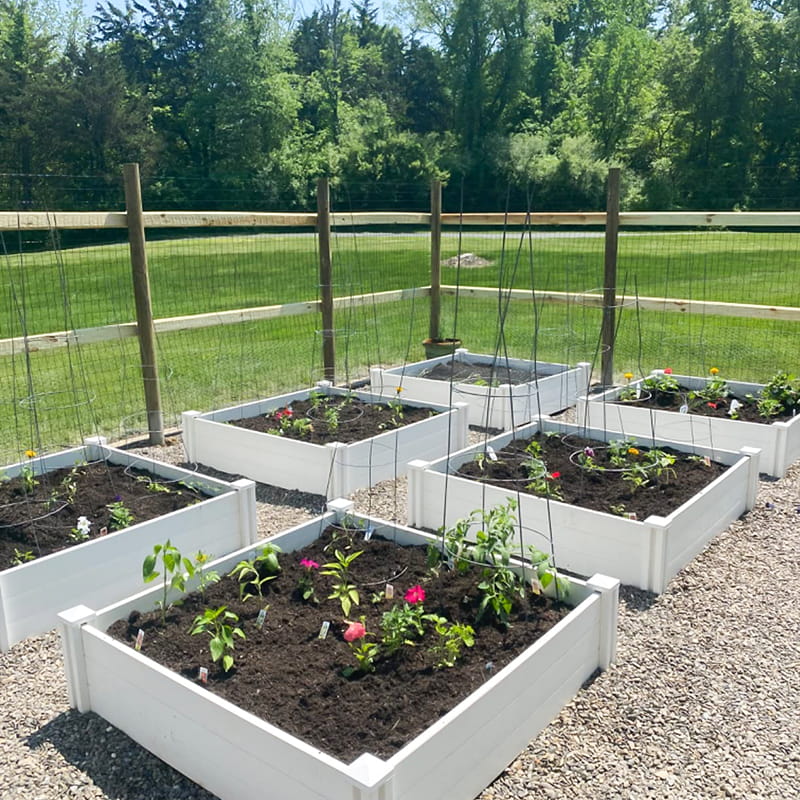 +86-572-8086381 / 8282992
+86-572-8086381 / 8282992  hzjfence1@hzjfence.com
hzjfence1@hzjfence.com  +86-572-8086381 / 8282992
+86-572-8086381 / 8282992  hzjfence1@hzjfence.com
hzjfence1@hzjfence.com 
Jul 09, 2025
Raised garden beds offer numerous benefits to home gardeners, from improved drainage and soil quality to easier access and pest control. While a variety of materials can be used for their construction, Polyvinyl Chloride (PVC) has emerged as a surprisingly advantageous option. Often overlooked in favor of traditional wood or metal, PVC offers a unique combination of durability, cost-effectiveness, and low maintenance that makes it a compelling choice for many gardening enthusiasts.
One of the most significant advantages of using PVC for raised garden beds is its exceptional durability. Unlike wood, which is susceptible to rot, warping, and insect damage, PVC is inherently resistant to these issues. It will not decompose or degrade when exposed to constant moisture from watering or rain, ensuring your raised bed maintains its structural integrity for many years. This longevity translates to less frequent replacement and repair, saving gardeners time and money in the long run. Furthermore, PVC is unaffected by extreme temperature fluctuations, meaning it won't crack or become brittle in harsh winters or scorch under intense summer sun.
For those concerned about the potential leaching of chemicals into their garden soil, PVC offers a reassuring level of chemical inertness. While some older forms of PVC might have contained phthalates, modern, rigid PVC (specifically unplasticized PVC or uPVC) used for construction and piping applications is highly stable and does not readily leach harmful substances into the surrounding environment, especially at the temperatures typically found in a garden. This makes it a safer choice for growing edible plants compared to some treated wood options that may contain preservatives. It's always advisable to source food-grade or potable water-safe PVC if there's any lingering concern, though standard uPVC is generally considered safe for garden use.
PVC is remarkably lightweight, which makes it incredibly easy to transport, handle, and assemble. This is a significant benefit for DIY gardeners who may not have access to heavy-duty equipment or assistance. The material can be easily cut with standard tools, and connections can be made quickly and securely using PVC cement or specialized fittings. This ease of manipulation allows for greater flexibility in designing custom-sized and shaped garden beds to fit specific spaces and needs, even for those with limited construction experience.

When considering the long-term investment, PVC often proves to be a highly cost-effective material for raised garden beds. While the initial outlay might be comparable to some types of lumber, its superior lifespan and minimal maintenance requirements significantly reduce overall costs. There's no need for periodic sealing, painting, or replacement due to rot or pest damage, as is often the case with wooden beds. This long-term economy makes PVC an attractive option for budget-conscious gardeners looking for a durable solution.
The inherent properties of PVC translate directly into low maintenance for raised garden beds. The smooth, non-porous surface of PVC is easy to clean and does not harbor mold, mildew, or pests. A simple wipe-down is usually sufficient to keep the beds looking neat. This contrasts sharply with wood, which often requires regular cleaning, treatment, and inspection for signs of decay or insect infestation. For gardeners who prefer to spend more time tending to their plants and less time on structural upkeep, PVC is an ideal choice.
While some may initially associate PVC with utilitarian applications, advancements in manufacturing have led to a wider range of PVC products, including those with improved aesthetics. PVC can be purchased in various colors, and its modular nature allows for highly versatile designs. Gardeners can create multi-tiered beds, incorporate trellises directly into the structure, or even build self-watering systems using PVC components. This adaptability allows for creative and functional garden bed solutions that can be tailored to individual preferences and garden layouts.
In conclusion, while traditional materials certainly have their place, PVC offers a compelling suite of advantages for the construction of raised pvc garden beds. Its unparalleled durability, chemical inertness, ease of use, cost-effectiveness, and low maintenance make it a practical and sustainable choice for both novice and experienced gardeners seeking a long-lasting and hassle-free solution for their garden spaces. As gardening continues to evolve, so too do the materials we use, and PVC stands out as a modern, efficient option for creating thriving raised beds.